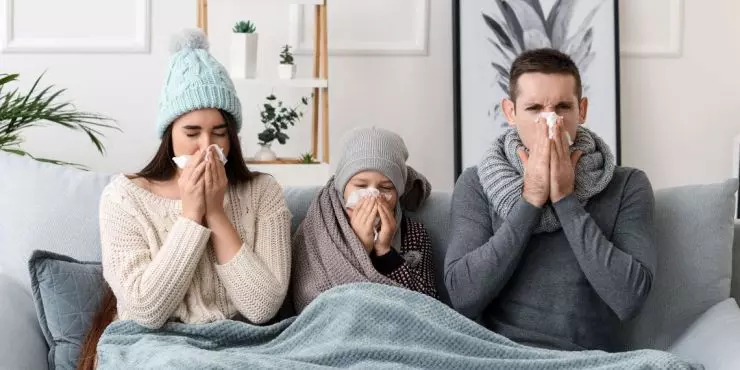
Let’s break down the flu, what symptoms to watch for, how to care for your family at home, when it's time to give us a call, and most importantly, how to prevent the flu from spreading through your home.
What is the Flu?

Influenza, commonly known as the flu, is a highly contagious respiratory virus that infects the nose, throat, and lungs. There are four main types of influenza:
- Influenza A and B are the most common types that cause seasonal epidemics, often referred to as flu season, almost every winter. These are the types that are typically included in the annual flu vaccine.
- Influenza A viruses are further classified into subtypes based on two proteins on their surface: hemagglutinin (H) and neuraminidase (N). Common subtypes circulating in people include A(H1N1) and A(H3N2). Influenza A viruses are also the only type known to cause pandemics.
- Influenza B viruses are not divided into subtypes but are classified into two lineages: B/Yamagata and B/Victoria.
- Influenza C viruses generally cause mild illness and are not typically associated with epidemics in humans.
- Influenza D viruses primarily affect cattle and are not known to cause illness in people.
But does the type matter? Yes, it can matter what type of influenza you have. Influenza A and B are the most common types that cause seasonal epidemics and are included in the annual flu vaccine. Influenza A is further classified into subtypes (like H1N1 and H3N2) and is the only type known to cause pandemics. Influenza C generally causes mild illness and is not typically associated with epidemics in humans and Influenza D primarily affects cattle and is not known to cause illness in people.
Therefore, knowing whether you have Influenza A or B is most relevant for understanding the severity of the illness, potential for widespread outbreaks, and the effectiveness of the annual vaccine
How Does it Spread?
The flu spreads easily through tiny droplets released when someone coughs, sneezes, or even talks. You can also pick it up by touching contaminated surfaces and then touching your eyes, nose, or mouth. Influenza viruses can survive on hard, non-porous surfaces like plastic and stainless steel for up to 48 hours. On porous surfaces such as cloth, paper, and tissues, the virus may disappear after about four hours. However, the longer the virus remains on a surface, the lower the risk of it causing an infection. Factors like temperature, humidity, and UV radiation can also affect how long the virus remains infectious.
While people are usually most contagious in the first 3-4 days after symptoms appear, the tricky part is you can actually pass it on a day before you even feel sick and up to a week afterward!
Flu Symptoms

The flu tends to arrive quite suddenly, often making you feel like you've been hit by a truck. Here are the common symptoms across all ages:
- Fever or chills: That unmistakable feeling of being too hot or too cold.
- Cough and sore throat: A persistent cough and a scratchy, painful throat.
- Runny or stuffy nose: The classic cold-like symptoms.
- Body aches, headache: Aches all over and a throbbing head.
- Fatigue and weakness: Feeling utterly drained and lacking energy.
- Decreased appetite: Not wanting to eat much.
- Nausea, vomiting, or diarrhea: These are more common in our younger kiddos.
Symptoms – When to Worry
While most flu cases resolve on their own, there are times when we need to be extra vigilant. Please call us or seek urgent care if you notice any of these more serious warning signs:
- Fast or difficult breathing, chest pain, shortness of breath: These are red flags for respiratory distress.
- Confusion, severe weakness, or hard-to-wake behavior: Especially in children, this can indicate a serious issue.
- Signs of dehydration: Dry mouth, no tears (in babies), very dark urine, or fewer wet diapers than usual.
- Persistent high fever or symptoms that improve and then quickly worsen: This "double-dip" illness can be concerning.
- Worsening of chronic conditions: If someone with asthma or heart failure experiences a flare-up.
How the Flu Shows Up at Different Ages
The flu can look a little different depending on the age of the infected person.
Infants Under 12 Months (Especially Under 6 Months)
Our littlest ones may not always run a high fever, but they can just seem "off." Watch for poor feeding, irritability, unusual sleepiness, or breathing faster than usual. Flu can escalate very quickly in this age group, so trust your instincts, mama.
Home Care:
- Saline drops and gentle suction before feeds can help clear tiny noses.
- Offer small, frequent feeds to keep them hydrated.
- A cool-mist humidifier can ease congestion.
- Dress them in light layers and manage fever as guided by your clinician.
Call your doctor promptly if your baby has:
- Any trouble breathing.
- Fewer than 3 wet diapers in 24 hours.
- Persistent vomiting.
- A rectal temperature of 100.4°F or higher if they're under 3 months old.
Toddlers and School-Age Kids
Expect sudden fever, cough, body aches, and fatigue. Kids can get dehydrated quickly, so fluids are super important!
Home Care:
- Plenty of fluids, rest, and fever reducers like acetaminophen or ibuprofen (please avoid aspirin in children).
- Saline sprays or rinses can help older kids with congestion.
- If your child has asthma, continue their inhalers/spacers as prescribed. If you don't have an asthma action plan, please ask us for one!
Call the doctor if:
- Breathing looks labored.
- Fevers last more than 72 hours.
- Your child is unusually sleepy or not drinking.
- Symptoms worsen after a brief improvement.
Teens and Healthy Adults
Sudden fever, sore throat, cough, and body aches are typical. Most of you will recover with good home care.
Call the doctor if:
- Chest pain or shortness of breath.
- A persistent high fever.
- An underlying condition that is worsening.
Older Adults and People with Chronic Conditions
The flu can be particularly tough here, potentially triggering pneumonia or making conditions like asthma, COPD, and heart failure worse.
Call if there is:
- Any shortness of breath beyond your usual baseline.
- Concerns about oxygen levels (especially if you monitor at home).
- Sudden swelling or weight gain.
- Confusion.
- Keep up with your action plans and medications diligently.
When to Treat at Home vs. When to Seek Care
Treat at home if symptoms are mild and improving:
- Manage fever and pain with over-the-counter medications.
- Encourage plenty of fluids and rest.
- Use saline sprays, humidifiers, and throat soothers (like warm tea with honey for adults and older kids).
Schedule a clinic visit if:
- Symptoms persist beyond a week without improvement.
- You hear wheezing, have ear pain or sinus pressure, or a chronic condition that is flaring.
- You are at higher risk for complications and want to discuss antiviral medicine.
Urgent care or ER now if:
- Trouble breathing, chest pain, or bluish lips/face.
- Signs of dehydration or confusion.
- Seizure, severe weakness, or hard-to-wake behavior.
- An infant under 3 months with a rectal temperature of 100.4°F or higher.
At Northwest Family Clinics, we offer same- or next-day appointments in Crystal, Plymouth, and Rogers. Just give us a call, and we'll help you decide the right setting for care.
Antiviral Medications – Who Benefits and When to Start
Antivirals like oseltamivir work best when started within 48 hours of symptoms appearing. They can shorten the illness a bit and, more importantly, significantly reduce the risk of complications in higher-risk individuals. We consider antivirals for:
- Infants and young children.
- Adults 65 and older.
- Pregnant or recently postpartum patients.
- People with chronic conditions (asthma, COPD, heart disease, diabetes, immunocompromise).
- Anyone with severe or rapidly worsening illness.
If you think you or your child might qualify, please call us promptly—don't wait to see if it gets worse.
Testing – Do You Always Need It?
Not always! During peak flu season, we can often diagnose the flu based on symptoms and a physical exam. Testing is most helpful if it will change how we manage the illness, for example, deciding on antivirals for a high-risk person or clarifying flu in a daycare or group setting.
Prevention That Actually Works

Daily Steps:
- Wash hands frequently: Teach your kids the "Happy Birthday" song trick for a 20-second scrub! Learn more about the importance of handwashing.
- Cover coughs and sneezes: Into your elbow, please, not your hands! And try to avoid touching your face.
- Disinfect high-touch surfaces: Think doorknobs, light switches, shared devices.
- Stay home when sick: This is so important! Return to school/work only after your fever has been gone for 24 hours without medication and your symptoms are clearly improving.
- Improve ventilation: Open windows or use a HEPA purifier indoors, especially during gatherings.
- Consider masking: If you're sick or around higher-risk family members during peak season, a mask can offer extra protection.
Vaccination:
- Everyone 6 months and older should get a flu vaccine every year. It truly is the single best prevention tool we have.
- Flu and COVID vaccines can be given on the same day. Convenient and safe!
- Pregnant patients can get the flu shot in any trimester. Those antibodies you develop help protect your newborn for their first few months of life.
- A special note for babies under 6 months, they are sadly too young for the flu vaccine, which makes it even more important for pregnant individuals and household contacts to get vaccinated.
Minnesota-Specific Things to Consider
Here in Minnesota, our flu season typically runs from October through April, with the highest activity usually in mid-winter. The colder weather means we spend more time indoors, which unfortunately increases the spread of viruses. If you have travel planned around the holidays, consider getting vaccinated 2-3 weeks before your trip for the best protection.
Our Northwest Family Clinics locations in Crystal, Plymouth, and Rogers provide flu shots for both kids and adults, and we can even help coordinate family vaccination in a single visit.
Your Home Care Kit Checklist
It's always a good idea to have these on hand:
- Digital thermometer
- Acetaminophen and ibuprofen (with a weight-based dosing chart for kids)
- Saline drops/spray and a cool-mist humidifier
- Oral rehydration solution or electrolyte packets
- Tissues, throat lozenges (for older kids/adults), and honey for coughs in kids over 1 year
- Your asthma/COPD action plan and refills, if applicable
Frequently Asked Questions

Can I still get the flu if I had the vaccine? Yes, but vaccination significantly lowers your chance of getting sick and makes the illness much milder with fewer complications.
How do I know if it’s a cold, flu, RSV, or COVID?
There's a lot of overlap! The flu often brings sudden high fever and body aches, RSV tends to cause more wheezing in infants, and COVID can vary widely. If you're high-risk or feeling very unwell, please call us to discuss testing and treatment.
Who should get antivirals?
Young children, adults 65+, pregnant or postpartum patients, people with chronic conditions or immunocompromise, and anyone with severe or progressive illness—ideally within 48 hours of symptom onset.
What about school and daycare policies?
Most follow symptom-based return rules: fever-free for 24 hours without fever-reducing medicine and symptoms clearly improving. Always check your specific program’s policy.
Are antibiotics ever helpful for flu?
Antibiotics do not treat viruses. We may prescribe them if there's a secondary bacterial infection (like an ear infection or bacterial pneumonia), but this is decided after an exam.
What can I do if someone in my household is high risk?
Get everyone vaccinated, consider masking during peak season or when anyone is sick, ventilate rooms, use a HEPA purifier, and separate sleeping spaces if possible while someone is acutely ill.
Can I get the flu and COVID vaccines together?
Yes! It's convenient and safe to receive them at the same visit. Mild side effects like a sore arm or fatigue are common and short-lived.
We’re Here for Your Family Through The Sniffles, Fevers and More
If you or your child has flu symptoms, please don't hesitate to call Northwest Family Clinics in Crystal, Plymouth, or Rogers. We'll help you decide if you can treat at home, whether testing or antivirals make sense, and how to protect other family members this season. Our goal is simple: fewer complications, faster recovery, and personalized guidance you can trust.